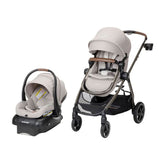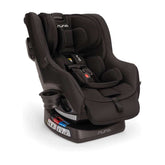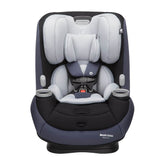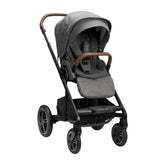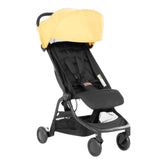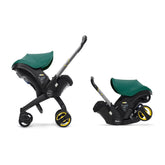10 Healthy Tips For How To Build Baby's Immune System

At ANB Baby, we understand that parents naturally want to provide the best possible start for their little ones. After all, a healthy immune system is essential for their overall well-being and development. Strengthening a baby's immunity involves a combination of proper nutrition, adequate sleep, and a clean environment. Today, we’re exploring effective strategies to boost your baby’s immune system, including the benefits of baby probiotics and the importance of ensuring adequate vitamin D levels with vitamin D drops.
Understanding Your Baby's Immune System
The immune system is a complex network of cells, tissues, and organs that work together to defend the body against harmful germs and infections. For babies, whose immune systems are still developing, it's crucial to provide the right support to enhance their natural defenses. By adopting healthy practices early on, you can help build a robust immune system for your baby.
1. Strengthen Baby's Immunity Through Breastfeeding: The Benefits of Colostrum
One of the most effective ways to strengthen your baby's immunity is through breastfeeding. Breast milk contains antibodies, enzymes, and white blood cells that provide essential protection against infections and diseases. According to the American Academy of Pediatrics (AAP), breastfeeding exclusively for the first six months can significantly reduce the risk of respiratory illnesses, ear infections, and gastrointestinal infections in infants. The first milk produced, known as colostrum, is particularly rich in immunoglobulins, especially IgA, which coats the baby's intestines and helps prevent germs from entering the bloodstream. This "liquid gold" is a critical component in developing your baby's immune system.

2. Introduce Baby Probiotics: Choosing the Right Probiotic
Probiotics are beneficial bacteria that support gut health and the immune system. Introducing baby probiotics can help maintain a healthy balance of gut flora, which is vital for immune function. Research indicates that probiotics can reduce the incidence of common infections, such as colds and diarrhea, in infants. When selecting a probiotic for your baby, look for strains that are well-researched and proven to be safe and effective for infants. Strains like Bifidobacterium and Lactobacillus are commonly recommended. Always consult with your pediatrician before starting any probiotic supplement.
3. Ensure Adequate Vitamin D Levels with Vitamin D Drops
Vitamin D plays a crucial role in supporting the immune system. It helps the body produce antimicrobial proteins that can eliminate viruses and bacteria. For babies, especially those who are exclusively breastfed, ensuring adequate vitamin D levels is essential because breast milk alone may not provide sufficient amounts. The AAP recommends that all breastfed infants receive 400 IU of vitamin D daily, starting within the first few days of life. Vitamin D drops are an effective way to ensure your baby meets this requirement. Consult your pediatrician for the appropriate dosage and brand recommendations.
4. Encourage Safe Sun Exposure
While direct sunlight can be a natural source of vitamin D, it's important to balance sun exposure to protect your baby's delicate skin. A few minutes of indirect sun exposure on the hands and face several times a week can help boost vitamin D levels. However, always avoid peak sun hours and use protective clothing and hats to shield your baby from harmful UV rays.

5. Provide a Nutrient-Rich Diet
As your baby transitions to solid foods, introducing a variety of nutrient-rich foods can further strengthen their immune system. Foods rich in vitamins, minerals, and antioxidants support overall health and immunity.
Key Nutrients to Build Baby’s Immunity
- Vitamin C: Found in fruits like oranges, strawberries, and kiwi, vitamin C enhances immune function by supporting the production of white blood cells.
- Zinc: This mineral, present in meat, beans, and fortified cereals, is vital for the development and function of immune cells.
- Iron: Essential for the production of hemoglobin, iron can be found in meat, fortified cereals, and leafy greens. Iron deficiency can impair immune function.
6. Maintain a Clean Environment
A clean environment reduces the risk of infections and illnesses in your baby. Regularly disinfecting surfaces, washing hands frequently, and avoiding contact with sick individuals are basic but effective measures.
Best Hygiene Practices to Build Baby’s Immunity
- Handwashing: Ensure everyone who handles your baby washes their hands thoroughly with soap and water.
- Clean Toys and Surfaces: Regularly clean and disinfect toys, feeding utensils, and frequently touched surfaces.
- Avoid Crowded Places: Limit exposure to crowded places where germs are more likely to spread, especially during the first few months.

7. Ensure Adequate Sleep by Establishing a Sleep Routine
Sleep is critical for a healthy immune system. Babies need significantly more sleep than adults to support their growth and immune function. Newborns typically require 14-17 hours of sleep per day, while infants aged 4-11 months need 12-15 hours, according to updated guidelines from the National Sleep Foundation.
Creating a consistent sleep routine helps your baby develop healthy sleep patterns. A soothing bedtime routine, such as a warm bath, gentle rocking, or reading a book, can signal to your baby that it's time to sleep. Ensure the sleep environment is calm, dark, and free from distractions.
8. Consider Vaccinations
Vaccinations are one of the most effective ways to protect your baby from serious diseases. They work by stimulating the immune system to produce antibodies without causing the disease itself. Following the recommended vaccination schedule helps build immunity against illnesses like measles, mumps, rubella, and whooping cough. Keep an open dialogue with your pediatrician about the vaccination schedule and any concerns you may have. Your pediatrician can provide guidance on the timing and importance of each vaccine.

9. Promote Physical Activity With Age-Appropriate Toys and Exercises
As your baby grows, encouraging physical activity can boost their immune system. Regular movement helps improve circulation, which allows immune cells to move more freely throughout the body. For infants, tummy time and gentle play can stimulate movement and development. As your baby becomes a toddler, encourage activities like crawling, walking, and playing with age-appropriate toys that promote physical activity.

10. Monitor and Manage Stress by Building a Supportive Environment
Stress can negatively impact the immune system, even in babies. Providing a loving, secure, and stimulating environment helps reduce stress and supports healthy development. Responding promptly to your baby's needs, providing physical affection, and creating a safe space for exploration and learning are crucial. Limiting exposure to stressful situations and ensuring your baby feels secure and loved contribute to a strong immune system.
A Bright Future: Ensuring Your Baby’s Immune Health
Building your baby's immune system is a multifaceted process that involves proper nutrition, adequate sleep, a clean environment, and proactive healthcare. By incorporating strategies such as breastfeeding, introducing baby probiotics, ensuring adequate vitamin D levels with vitamin D drops, and maintaining good hygiene practices, you can provide a solid foundation for your baby's health. Encourage a nutrient-rich diet, safe sun exposure, physical activity, and a supportive environment to further enhance their immunity.
Visit ANB Baby for all your baby care needs. Our wide selection of high-quality products will help you give your baby the healthy start they deserve. With the right approach and resources, you can confidently support your baby's immune system and overall well-being.

